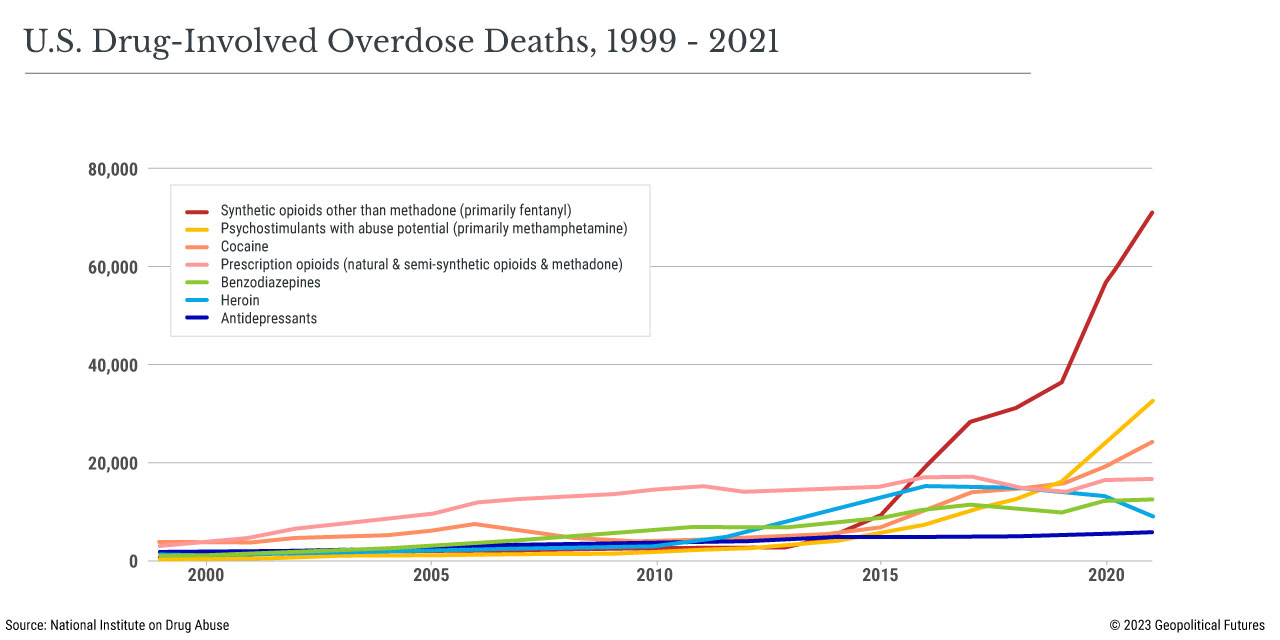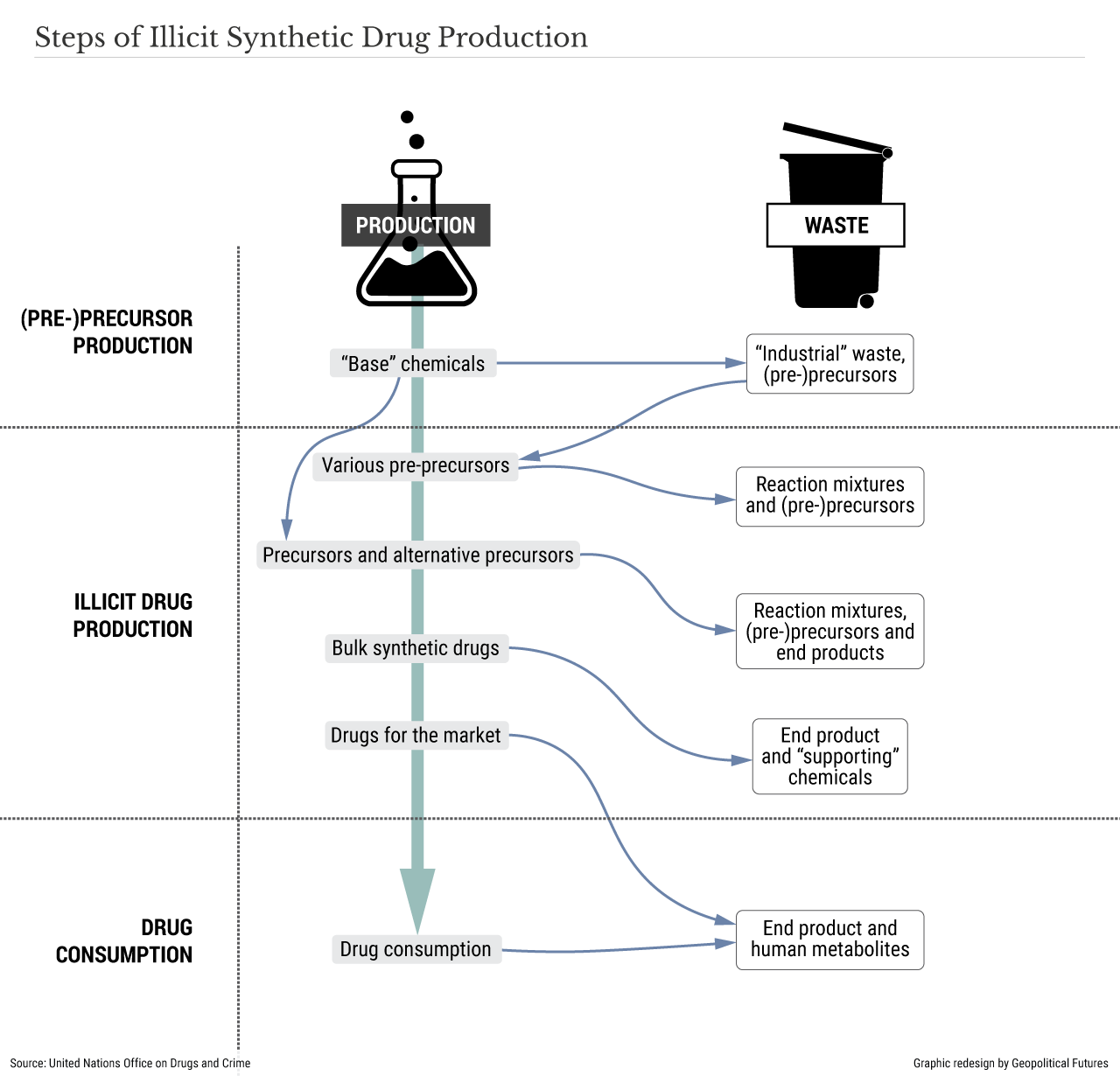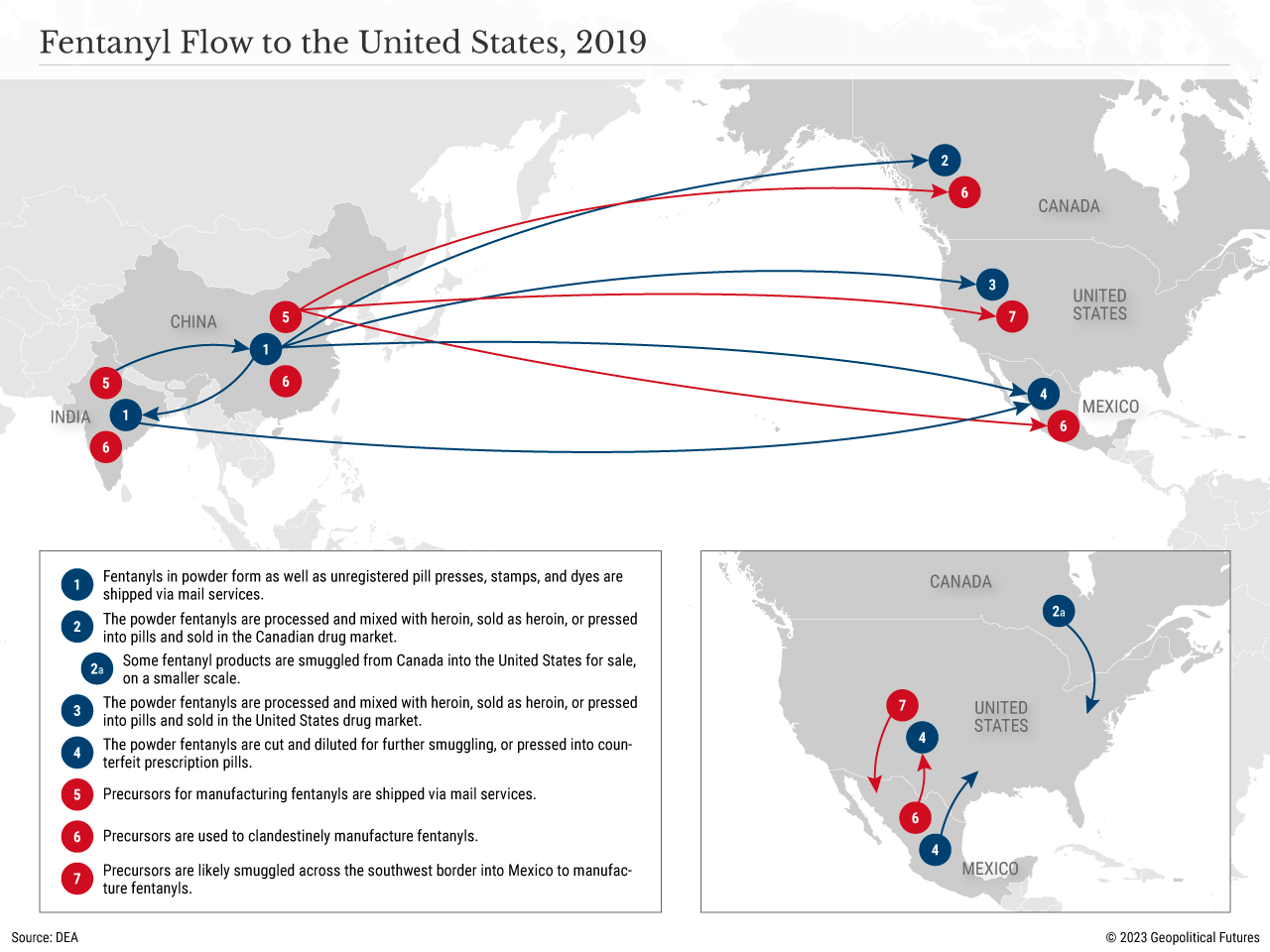For the US, fentanyl is all about China
While many governments around the world are focused on securing supply chains, there’s at least one the U.S. government desperately wants to break up: the fentanyl supply chain. Nearly a dozen U.S. government agencies are working together to choke off illicit flows of the drug. In addition to saving American lives, Washington wants to reduce insecurity in Latin America and highlight China’s role in the fentanyl trade to introduce an anti-China element into its security cooperation, particularly with Mexico and Colombia.
China’s rapid growth has over the past two decades helped it develop its economic influence in Latin America – aided in no small part by the absence of a U.S. counter-strategy. At first, Washington saw Beijing’s growing presence as simple economic diversification, and thus no threat to hemispheric security or U.S. security and military relationships with Latin America. Only recently has the U.S. started to see China’s commercial activities in the region as a potential threat, especially as it relates to U.S. access to rare earth elements and the security of allies’ ports and 5G technology.
At the same time, China’s economy is in secular decline. This slowdown, combined with the United States’ drive to decouple supply chains from China, is naturally steering Mexico back toward its northern neighbor. Mexico is an obvious destination for multinational firms that want to manufacture close to the U.S. market at a relatively low cost. For its part, Colombia – for years a beneficiary of Chinese trade and investment – has gotten closer to Beijing politically since the inauguration in 2022 of President Gustavo Petro. However, it too is questioning the future of Chinese foreign investment and trade, leading it to consider alternatives such as the United States.
But Washington doesn’t want to be an alternative patron; it wants to rebuild its influence while eroding that of China. To that end, it needs a wedge, and the consumption of fentanyl is a prime issue. In the U.S. alone, overdose deaths as a result of fentanyl use have skyrocketed over the past eight years to almost 110,000 in 2022. The opioid epidemic cost the U.S. economy $1.5 trillion in 2020 alone, according to estimates from the U.S. Congress’ Joint Economic Committee, while the Council on Foreign Relations calculates that it has removed more than 6 million people from the workforce.
Consumption is less of a concern in Mexico and Colombia, but that’s beginning to change. However, the more immediate concern in those countries is production and the insecurity and corruption that tend to accompany the drug trade. Due to its low production costs and synthetic nature, fentanyl production can be scaled up rapidly. Two Mexican cartels, Sinaloa and the Jalisco New Generation Cartel, have a monopoly on the U.S.-Mexico fentanyl trade. The Sinaloa cartel is also considering opening operations in Colombia, including starting fentanyl “kitchens,” sourcing input materials and potentially building networks within the health care sector to tap into Colombia’s legal stream of the drug.
Chinese companies provide nearly all the precursor materials for fentanyl production in the Western Hemisphere. Not only that, but at least four Chinese companies offer information on optimizing fentanyl manufacturing, including providing customers with ingredients, advice on substitute ingredients, instructions on mixing and access to chemists. Other Chinese companies provide false labels on shipments and/or ship chemicals without keeping customer records.
Fentanyl is a profitable business. A single fake pill laced with fentanyl may cost 10 cents to make but will sell for $10 on the street. Chinese criminal groups and the Sinaloa and Jalisco cartels have pooled their extensive money laundering experience, using mirror transfers, trade-based money laundering and bulk cash movements to facilitate the exchange of foreign currency. As an added bonus, this practice helps streamline the purchase of precursor chemicals.
Now, however, the U.S. government and partners are fighting back. In February, the Biden administration engaged Mexico, Colombia and Ecuador to collaborate against the growing availability and lethality of illegal drugs containing fentanyl. In March, Mexico’s president wrote to his Chinese counterpart, Xi Jinping, seeking help stemming the flow of fentanyl to North America. (Beijing denied any wrongdoing.) In April, the U.S. charged four leading members of the Sinaloa cartel linked to the fentanyl trade. And in May, the Mexican president said his country’s navy had intercepted a container from Qingdao, China, that contained 75 pounds of packages with traces of fentanyl and methamphetamine. The U.S. also sanctioned seven Chinese companies and six individuals accused of exporting tablet presses to Mexico. Last month, the U.S. Justice Department filed criminal charges against four Chinese chemical manufacturers and eight individuals accused of illegally trafficking precursor chemicals used to make fentanyl. In spite of these developments, the head of the U.S. Drug Enforcement Administration said recently that she wants to see more cooperation from Mexico.
In Colombia, cocaine has become a secondary concern because it is less lethal and less profitable than fentanyl. Earlier this month, the U.S. Embassy in Bogota said it was indefinitely suspending its monitoring of coca crops in Colombia and would not produce its annual report on Colombia and cocaine. The embassy explained that U.N. reports made its work redundant and that observation satellites were needed for other purposes. (Colombia’s justice minister said he did not expect the decision to jeopardize U.S. funding for anti-drug and other programs.) Meanwhile, U.S. agencies reportedly coordinated with Colombian authorities earlier this year to arrest Sinaloa cartel members who were attempting to develop the fentanyl industry in Colombia.
The Colombian and Mexican governments agree on the need to change their anti-drug strategies. In Bogota, the Petro administration wants to move away from punitive, prohibitionist and militarized policies and instead target illicit profits, money laundering, large traffickers and mafias. Calling the war on drugs a failure, Petro said the same mistakes should not be repeated with fentanyl. Similarly, Mexico’s government wants to focus on economic development and youth outreach to reduce incentives for joining criminal organizations. The two presidents plan to meet in early September to discuss new anti-drug strategies. Talks will focus on youth prevention and socio-economic development. They also plan to address the challenge of synthetic drugs and the importance of adjusting interdiction, prevention and rehabilitation to meet new realities and social needs.
Many of these efforts will require the support of and collaboration with the U.S., which until recently was reluctant to link drug trafficking and economic development. The key question is whether Mexico City and Bogota will get on board with Washington’s anti-China approach. The answer may depend on whether the U.S. is prepared to align its anti-drug initiatives with new strategies taking shape in Mexico and Colombia.











